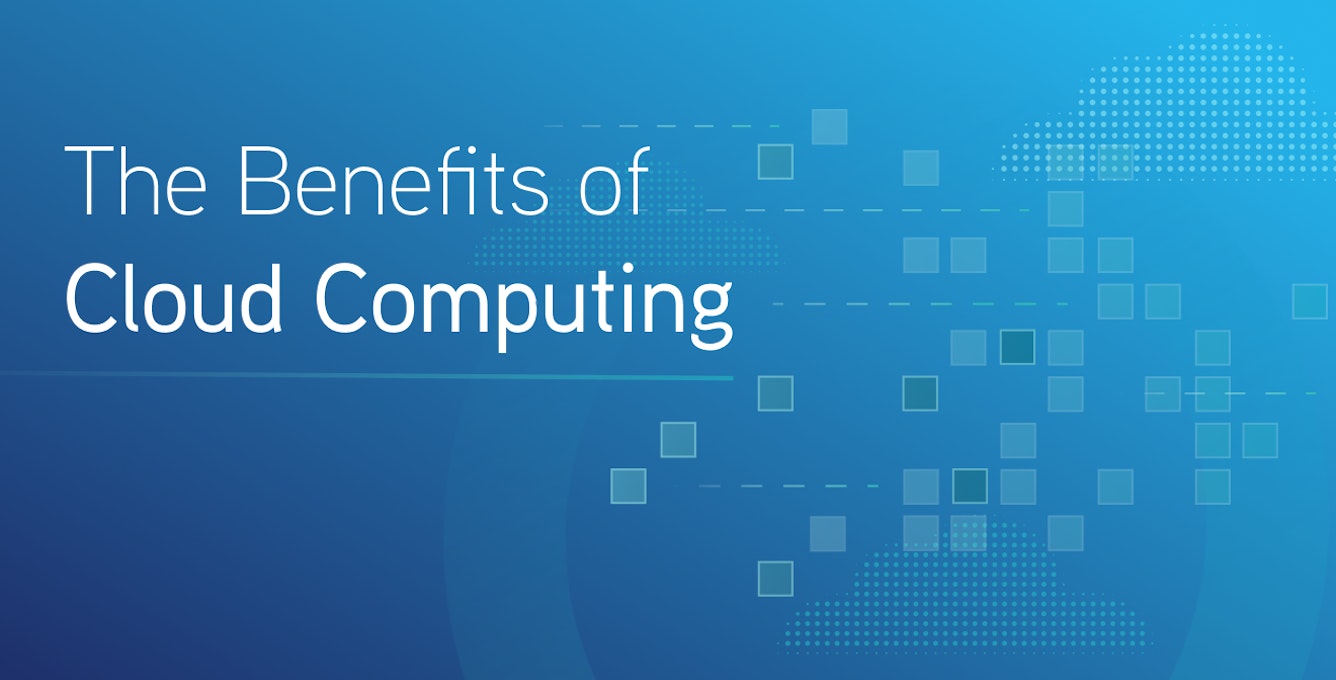Cloud Topics
The Benefits of Cloud Computing
By Nicole Lim / July 28, 2020

Cloud computing is an increasingly popular method of saving data and utilizing external processing power. Cloud services may be either public or private and involve non-local data management on external servers where said data is virtually compartmentalized using software. While any method of data storage has its downfalls, cloud computing is ultimately no less secure than on-premise data management. Furthermore, cloud computing offers significant additional benefits that are sometimes overlooked. These are just some highlights of the advantages cloud computing can offer organizations.
1. Automatic Software Updates
One of the most useful benefits of cloud computing is how much it reduces the workload of the business that uses it. Many things that would need to be maintained and monitored by you or your tech team otherwise are handled instead by the cloud management team. This includes important software updates and security patches. This is especially useful if you or your tech team have many other duties and projects to attend to, as it can free up some of your time. Rather than employing an in-house tech team to shut down a server during the workday, or come in on weekends to perform routine maintenance, the cloud system can be updated overnight with minimal disruption of normal work activities. When cloud computing is accessed as a subscription commerce service solution, the opportunities to automate routine functions and support or secure operations can be transformative.
2. Cost Savings
Implementing cloud computing services can save the company money in the long run compared to maintaining on-premise servers. As previously mentioned, the use of cloud servers can reduce the need for labor, and furthermore, the external processing power can eliminate the need to spend money on localized hardware and software as your data management needs grow. Subscription services can also make for more predictable, consistent capital expenditures and operational budgets, supporting bookkeeping as well as realizing savings over the life of the subscription.
3. Data Security
Cloud providers are experts in cloud security and adhere to best-in-class security practices. Many cloud computing security protocols are even automated, which eliminates the possibility of many instances of security breaches based on human error. Cloud servers also usually encrypt data as a standard security measure. Additionally, due to the fact that the data is managed off-premise, cloud computing also reduces the risk of data breaches caused by dishonest or disgruntled employees.
It is also worth noting that security measures and data management protocols are consistent within each cloud server. This prevents gaps in security that many legacy systems develop from inconsistencies in data management. Expansion of on-premise systems over time may result in technology that does not integrate with each other and that may employ different security methods.
Many people are especially concerned about cloud security as it relates to mobile access. However, a few basic data security measures can prevent your data from being compromised. This includes:
- Using a strong password;
- Using a two-factor authentication;
- Using an anti-malware program;
- Avoiding sharing personal information;
- Being careful on public Wi-Fi.
4. Efficiency
As mentioned, cloud computing reduces the need to locally store data and provides additional, external processing power, which allows the business to avoid on-premise expansion of hardware and software. On that note, cloud computing eases the transition when it comes to scalability. You don’t need to invest as much time, money, space, etc. on building up your on-premise resources to handle increased demand in terms of data storage and processing power.
This factor can be especially useful if that demand fluctuates over time. When it comes to cloud computing, you only pay for what you use, so you’re not wasting resources during downswings. Cloud computing can also give you access to specialized systems needed for one-time projects without any need to invest in the system long-term for your personal use.
For example, a common cloud computing model is SaaS (software as a service), which grants users access to centrally hosted software on a subscription basis, and can often be purchased through a cloud marketplace. A well-known example of SaaS is Google Docs. However, the software could be anything, and many cloud computing providers will allow you to integrate this service with data storage and management options.
5. Decentralized Mobility
With the explosion of the remote workforce, having staff or operations tethered to a physical location can be increasingly cumbersome and impractical. Cloud computing can facilitate remote access to important files and systems without sacrificing security, freeing up the office, and allowing more teams and individuals to telecommute. Cloud computing allows employees to access these resources from virtually anywhere, anytime.
This decentralized support also facilitates new methods of collaboration. When more staff are working from home or telecommuting from across the country (or world), having projects, records, and innovative new systems operating from the cloud provides flexibility among teams to connect and collaborate when they need to, without having to meet in person.
6. Loss Prevention
Data encryption and non-local data management can prevent both theft and loss/destruction of assets. We have already discussed the security measures employed by cloud computing servers, but it’s also important to note that non-local storage prevents loss of information resulting from damage to your local hardware (for example, if there was a fire in your building), or loss of productivity due to localized power loss.
Many businesses also simply use cloud computing as a backup to supplement their on-premise data management in the event of data loss or limitations to access. It is difficult to lose data stored in the cloud, as it is saved in multiple locations, and even in the unlikely event that it is lost, the cloud computing service would be liable for that lost data.
7. Sustainability
Implementing cloud computing into daily business operations is a great way to support sustainability in the workplace. Major cloud services providers are able to leverage their scale to pioneer innovative green initiatives to offset their environmental impact. Google, Amazon, and Microsoft, all major plays in the cloud services sector, have committed to trialing a range of efforts, including sustainable power purchasing, investments in energy efficiency solutions, and investing in new green technologies to support their development.
In short, cloud computing can absolutely be a secure way to store and manage your data, as well as improve efficiency in your business model. This will especially be the case if you directly consult an expert with your cloud computing service, to see how you can most effectively use the service to your unique business’s advantage.
Related Articles

Cloud Topics
An Introduction to Online Marketplaces
An online marketplace is a website or app that offers products or subscription services, either from a range of brands or from a single provider. The ...By Nicole Lim / AppDirect / May 25, 2020

Cloud Topics
How to Overcome Challenges in Your Go-to-Market Strategy
Launching a digital service on an online marketplace can be overwhelming. However, with an effective go-to-market (GTM) strategy, you can gain a compe...By Nicole Lim / AppDirect / July 1, 2020

Cloud Topics
How 5G Benefits Business and Technology Innovation
Updated December 2, 2025 Imagine a world where businesses can instantly respond to customer needs, automate complex operations in real time, and conn...By Denise Sarazin / AppDirect / February 6, 2025